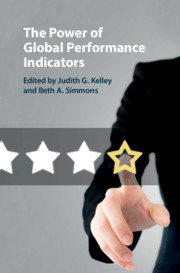Book contents
- The Power of Global Performance Indicators
- The Power of Global Performance Indicators
- Copyright page
- Contents
- Figures
- Tables
- Contributors
- Preface
- 1 Introduction
- Part I Ratings, Rankings, and Regulatory Behavior
- Part II The Normative Influence of Ratings and Rankings
- 5 A Race to the Top? The Aid Transparency Index and the Social Power of Global Performance Indicators
- 6 International Assessments and Education Policy
- 7 Reporting Matters
- 8 Freedom House’s Scarlet Letter
- Part III Beyond and Within State
- Part IV Skeptical Voices
- Index
- Chapter 3: Appendices
- Chapter 4: Appendices
- Chapter 5: Appendix
- Chapter 6: Appendix
- Chapter 7: Appendix
- Chapter 8: Appendix
- Chapter 10: Appendix
- Chapter 11: Appendix
- Chapter 12: Appendix
- References
6 - International Assessments and Education Policy
Evidence from an Elite Survey
from Part II - The Normative Influence of Ratings and Rankings
Published online by Cambridge University Press: 28 February 2020
- The Power of Global Performance Indicators
- The Power of Global Performance Indicators
- Copyright page
- Contents
- Figures
- Tables
- Contributors
- Preface
- 1 Introduction
- Part I Ratings, Rankings, and Regulatory Behavior
- Part II The Normative Influence of Ratings and Rankings
- 5 A Race to the Top? The Aid Transparency Index and the Social Power of Global Performance Indicators
- 6 International Assessments and Education Policy
- 7 Reporting Matters
- 8 Freedom House’s Scarlet Letter
- Part III Beyond and Within State
- Part IV Skeptical Voices
- Index
- Chapter 3: Appendices
- Chapter 4: Appendices
- Chapter 5: Appendix
- Chapter 6: Appendix
- Chapter 7: Appendix
- Chapter 8: Appendix
- Chapter 10: Appendix
- Chapter 11: Appendix
- Chapter 12: Appendix
- References
Summary
In recent years, an increasing number of countries have participated in cross-national assessments in education (CNAs), but their impact remains underexplored. We argue that CNA participation increases the capacity and motivation of policymakers to implement improvements in education through mechanisms at the elite, domestic, and transnational levels. We find evidence consistent with our propositions using an original survey of 77 education officials directly responsible for the planning and implementation of CNAs in 46 countries and personal interviews with 48 officials in target states, assessment agencies, and donor agencies.
Keywords
- Type
- Chapter
- Information
- The Power of Global Performance Indicators , pp. 174 - 202Publisher: Cambridge University PressPrint publication year: 2020
References
- 4
- Cited by

